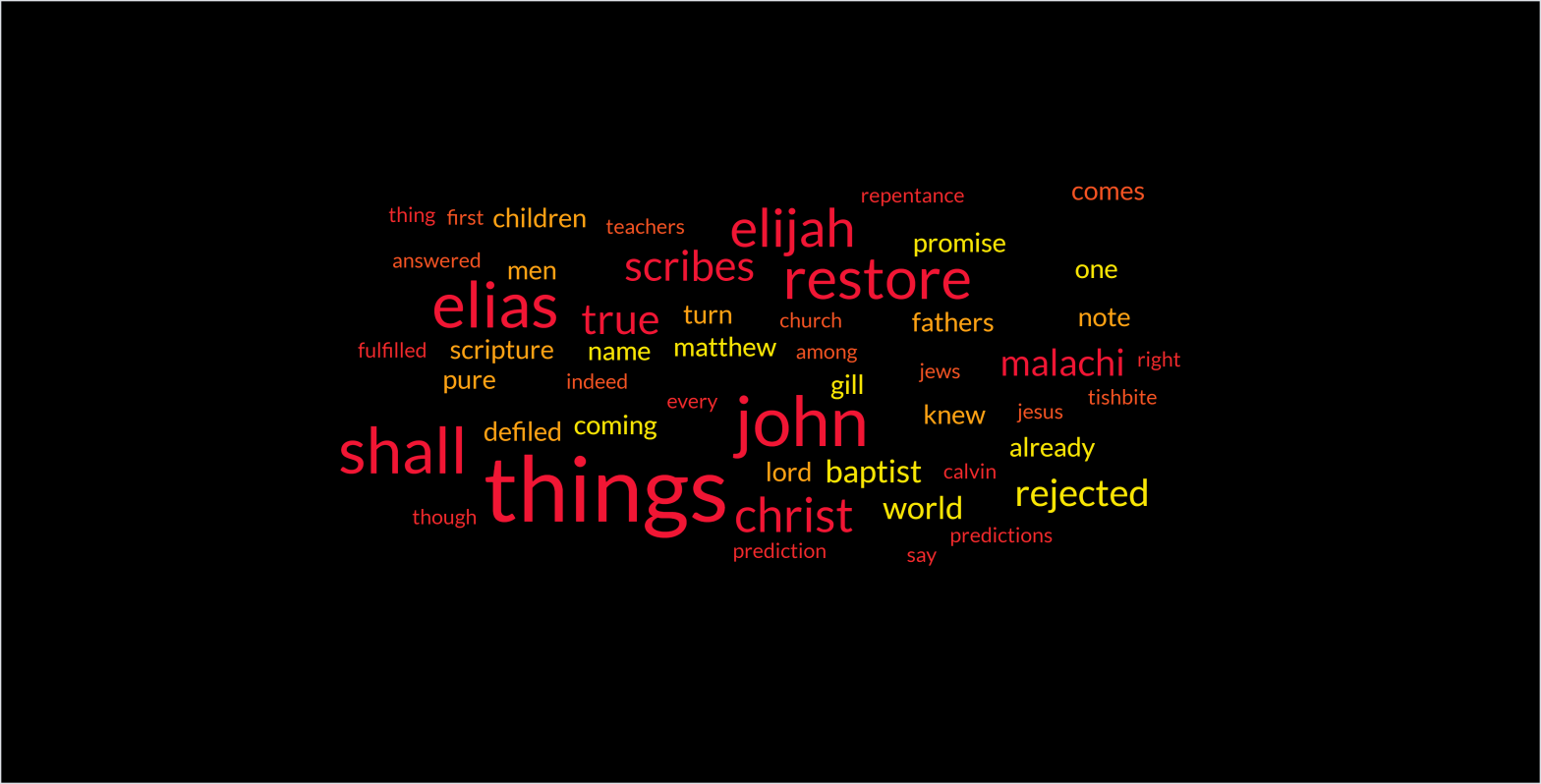[Jesus] answered,
“Elijah does come, and he will restore all things.”
(Matthew 17:11, ESV)
How do sound teachers from Church history answer this question?
And Jesus answered and said unto them
By way of concession,
John Gill
Elijah indeed will come first.
this is indeed a tenet of the Scribes, and it is also certain, that there is a prophecy in (Malachi 4:5) of the coming of Elias; of one that goes under that name, not of Elias the Tishbite, in person, but of one that was to come in his power and spirit,
John Gill
We have stated elsewhere the origin of that error which prevailed among the Jews. As John the Baptist was to resemble Elijah by restoring the fallen condition of the Church, the prophet Malachi (Malachi 4:5) had even given to him the name of Elijah; and this had been rashly interpreted by the scribes, as if Elijah the Tishbite (1 Kings 17:1) were to return a second time to the world. Christ now declares that every thing which Malachi uttered was true, but that his prediction had been misunderstood and distorted from its true meaning. “The promise,” says he, “that Eliah would come was true, and has been already fulfilled; but the scribes have already rejected Elijah, whose name they idly and falsely plead in opposing me.”
John Calvin
Christ allows the prediction (v. 11); “Elias truly shall first come, and restore all things; so far you are in the right.” Christ did not come to alter or invalidate any thing foretold in the Old Testament. Note, Corrupt and mistaken glosses may be sufficiently rejected and exploded, without diminishing or derogating from the authority or dignity of the sacred text. New-Testament prophecies are true and good, and are to be received and improved, though some hot foolish men may have misinterpreted them and drawn wrong inferences from them. He shall come, and restore all things; not restore them to their former state (John Baptist went not about to do that), but he shall accomplish all things (so it may be read), all things that were written of him, all the predictions of the coming of Elias. John Baptist came to restore things spiritually, to revive the decays of religion, to turn the hearts of the fathers to the children; which means the same with this, he shall restore all things. John preached repentance, and that restores all things.
He asserts the accomplishment. The scribes say true, that Elias is come, v. 12. Note, God’s promises are often fulfilled, and men perceive it not, but enquire, Where is the promise? when it is already performed. Elias is come, and they knew him not; they knew him not to be the Elias promised, the forerunner of the Messiah. The scribes busied themselves in criticizing upon the scripture, but understood not by the signs of the times the fulfilling of the scripture. Note, It is easier to explain the word of God than to apply it and make a right use of it. But it is no wonder that the morning star was not observed, when he who is the Sun itself, was in the world, and the world knew him not.
Matthew Henry
And will restore all things.
The Syriac and Persic versions render it, “shall perfect, or complete all things”, that are prophesied of him; and shall put a period to the law and the prophets, and close the Mosaic economy, and direct persons to Christ; in whom are the perfection of the law, and the fulfilling of the prophets.
The Arabic version reads it, “he shall teach you all things”; the whole of the Gospel being to be reduced to these two heads, repentance towards God, and faith in Christ; both which were taught by the true Elias: but the truest sense of the phrase is to be learned out of (Malachi 4:6) .
“He shall restore, he shall turn all things, the heart of the fathers to the children, and the heart of the children to their fathers”; and as this is explained in (Luke 1:17) “he shall turn the disobedient to the wisdom of the just, and make ready a people prepared for the Lord”: which is other, and better sort of work, than what the Jews assign to their Elias, whom they expect, and whom they make to be a restorer of all things, in their way: they often speak of his purifying of things, or pronouncing things pure, that were defiled; and among others, that he will purify bastards, and, “restore them” to the congregation of the Lord.
Though Maimonides denies, that when he comes he will pronounce defiled that which is pure, or pronounce pure, that which is defiled.
They pretend, that he is now employed, and very busy, in writing everything that is done in every age; so that when he comes, he will be able to give an account of everything: and nothing is more common with them, than to say concerning any matter, that there is any doubt or difficulty about it, “let it be left till Elias comes”.
John Gill
This does not mean that John the Baptist restored them perfectly, but that he conveyed and handed them over to Christ, who would complete the work which he had begun. Now as the scribes had shamefully rejected John, Christ reminds his disciples that the impostures of such men ought not to give them uneasiness, and that it ought not to be reckoned strange, if, after having rejected the servant, they should, with equal disdain, reject his Master. And that no one might be distressed by a proceeding so strange, our Lord mentions that the Scripture contained predictions of both events, that the Redeemer of the world, and Elijah his forerunner, would be rejected by false and wicked teachers.
John Calvin

